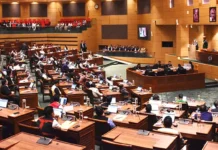NEW DELHI, Feb 1: Finance Minister Nirmala Sitharaman on Saturday announced cuts in personal income tax, extended tax benefits for affordable housing, and gave relief to companies on payment of dividend in the union budget for 2020-21 as the government looked to boost consumption to bring the economy out of the worst slowdown in 11 years.
The minister proposed raising customs duty on a variety of products, ranging from tableware and kitchenware, electrical appliances to footwear, furniture, stationery and toys to give a level playing field to domestic companies and boost ‘Make in India’.
Offering an optional lower rate of income tax to individuals, Sitharaman in her budget for 2020-21 proposed new tax slabs of 15 percent and 25 percent in addition to the existing 10 percent, 20 percent and 30 percent. The new IT slabs would be for individuals not availing certain specified deductions or exemptions.
Under the proposed IT slab, annual income upto Rs 2.5 lakhs is exempt from tax. Those individuals earning between Rs 2.5 lakhs and Rs 5 lakhs will pay 5 percent tax.
Income between Rs 5 and 7.5 lakhs will be taxed at 10 percent, while those between Rs 7.5 and 10 lakhs at 15 percent. Those earning between Rs 10 and 12.5 lakhs will pay tax at the rate of 20 percent, while those between Rs 12.5 and Rs 15 lakhs will pay at the rate of 25 percent. Income above Rs 15 lakhs will be taxed at 30 percent.
Individuals opting for taxation under the new rates will not be entitled to exemption/deductions, including under Section 80C and 80D, LTC, housing rent allowance, deduction for entertainment allowance, professional tax, and interest on self occupied/vacant property.
Currently, annual income upto Rs 2.5 lakhs is exempt from IT. While a 5 percent tax is charged for income between Rs 2.5 and 5 lakhs, 20 percent for income between Rs 5 lakhs and Rs 10 lakhs and 30 percent for those earning above Rs 10 lakhs.
“The new tax regime shall be optional for taxpayers,” Sitharaman said.
“The proposed tax structure will provide significant relief to taxpayers and more so to those in the middle class,” she added.
To boost growth, Sitharaman announced higher spendings on infrastructure, rural development and the agri sector.
The finance minister said the government is proposing a 16-point action plan to boost agriculture and farmers’ welfare.
Agricultural services need copious investments, she said, adding government has insured 6.11 crore farmers under the Pradhan Mantri Fasal Bima Yojna.
With her post 2019-20 budget corporate tax cut drilling a Rs 1.45 lakh crore hole in government revenues, the minister hiked the fiscal deficit target for current fiscal to 3.8 percent of GDP, from 3.3 percent.
For 2020-21, she pegged the fiscal deficit at 3.5 percent.
Minority affairs ministry allocation increased
The finance minister announced a Rs 5,029 crore outlay for the minority affairs ministry in the 2020-2021 fiscal, an increase of Rs 329 crore from last year.
Minority Affairs Minister Mukhtar Abbas Naqvi hailed the general budget and said it is a budget to strengthen the economy.
According to the general budget, the amount has been increased for post-matric and pre-matric scholarships and some other schemes of the ministry.
Last fiscal, a total amount of Rs 4,700 crore was allocated for the ministry of minority affairs.
“This is a budget for the common people. In this budget the poor, the farmers and the young have all been taken care of. The budget is to strengthen the country’s economy,” Naqvi said.
‘Kisan rail’ in PPP mode
Sitharaman proposed to set up a ‘kisan rail’ in public-private-partnership (PPP) mode for cold supply chain to transport perishable goods.
The FM announced a slew of measures for the benefit of farmers.
“To build a seamless national cold supply chain for perishables, the Indian Railways will set up kisan rail through PPP model, so that perishable goods can be transported quickly,” she said.
She also said refrigerated parcel vans on select mail expresses and freight trains for carrying perishable cargo are also on the anvil.
Perishable goods like fruits, vegetables, dairy products, fish, meat need to be carried in such temperature controlled vans in order to travel long distances.
The proposal to use refrigerated parcel vans to ferry perishables was first announced by then railway minister Mamata Banerjee in the 2009-10 budget. However, it failed to take off. (PTI)




